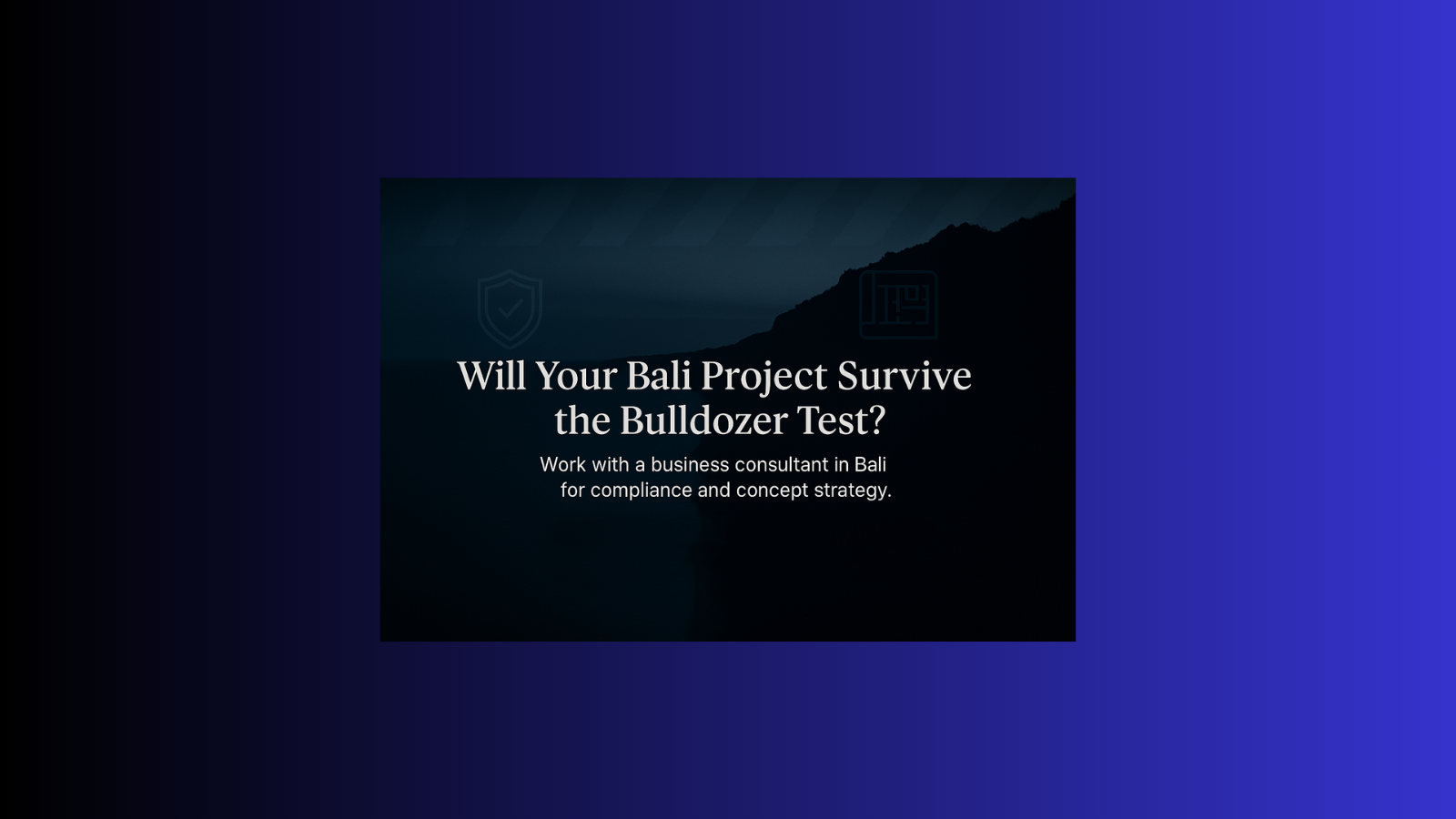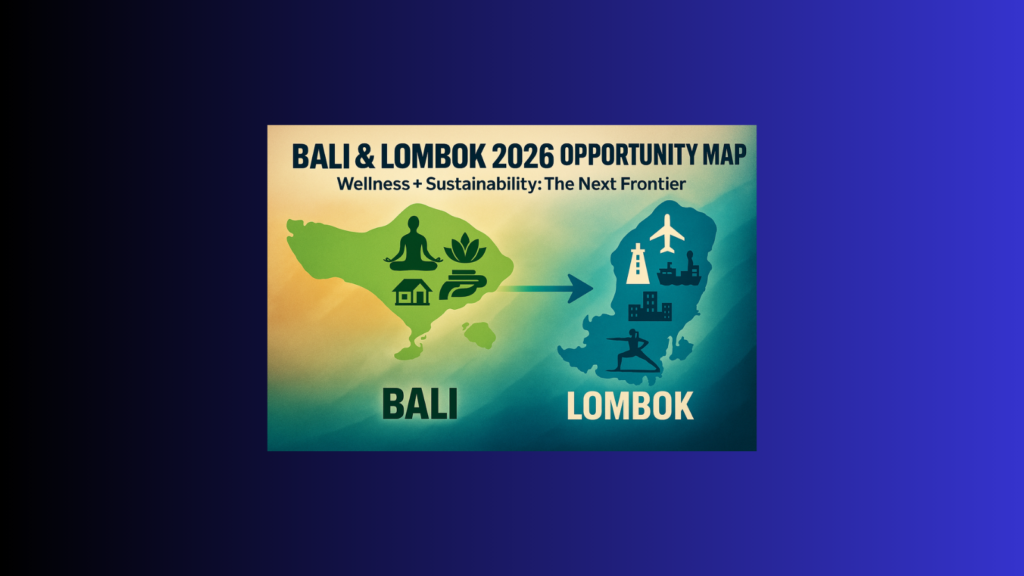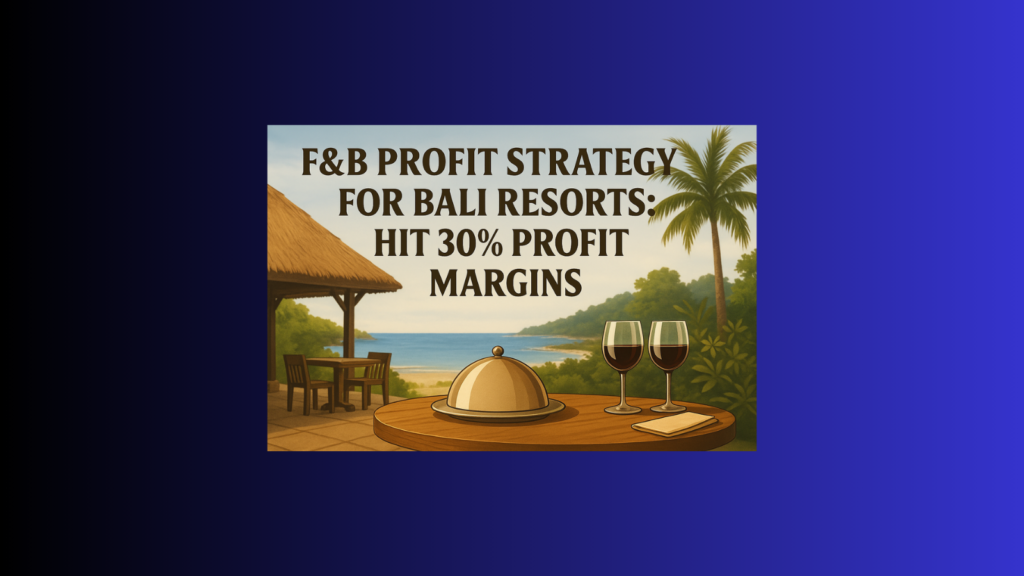Bali and Indonesia offer immense opportunities for investors and entrepreneurs in hospitality, wellness, and tourism. Working with a business consultant in Bali is the fastest way to stay compliant and build a concept the market actually wants. Yet alongside the tropical allure lies a complex web of regulations and a fiercely competitive market. Building a successful venture in Bali means mastering two critical domains: regulatory compliance and product/concept strategy.
This guide shows how legal business setup and permits combine with feasibility studies and concept development to create thriving businesses. We highlight real-world Bali examples, cautionary tales of non-compliance (like the Bingin Beach demolitions), and the payoff of aligning your concept with market demand. In the end, you’ll see why a holistic consulting approach—covering both permits and product strategy—is the key to sustainable success in Bali’s dynamic environment.
The Opportunity and the Challenge in Bali & Indonesia
Bali’s booming tourism and lifestyle sectors make it a magnet for foreign and local investors. The island offers opportunities in high-end F&B, boutique resorts, wellness retreats, fitness centers, and more. However, Bali’s very popularity brings challenges: the market is mature and saturated in many areas, meaning tough competition and discerning customers. Moreover, Indonesian regulations have become stricter, especially in Bali, where authorities are clamping down on illegal businesses and unlicensed developments. In short, there’s huge potential for reward, but also high risk if you misstep.
Investors in Indonesia must navigate two parallel journeys: establishing a legal, compliant business structure, and designing a concept that resonates with the market. A spa resort or restaurant might have a brilliant theme, but if it’s built on unzoned land or without permits, it could literally get bulldozed. Conversely, a fully licensed company might still fail if the product is misaligned with customer expectations. The stakes are high on both fronts, so let’s dive into each one.
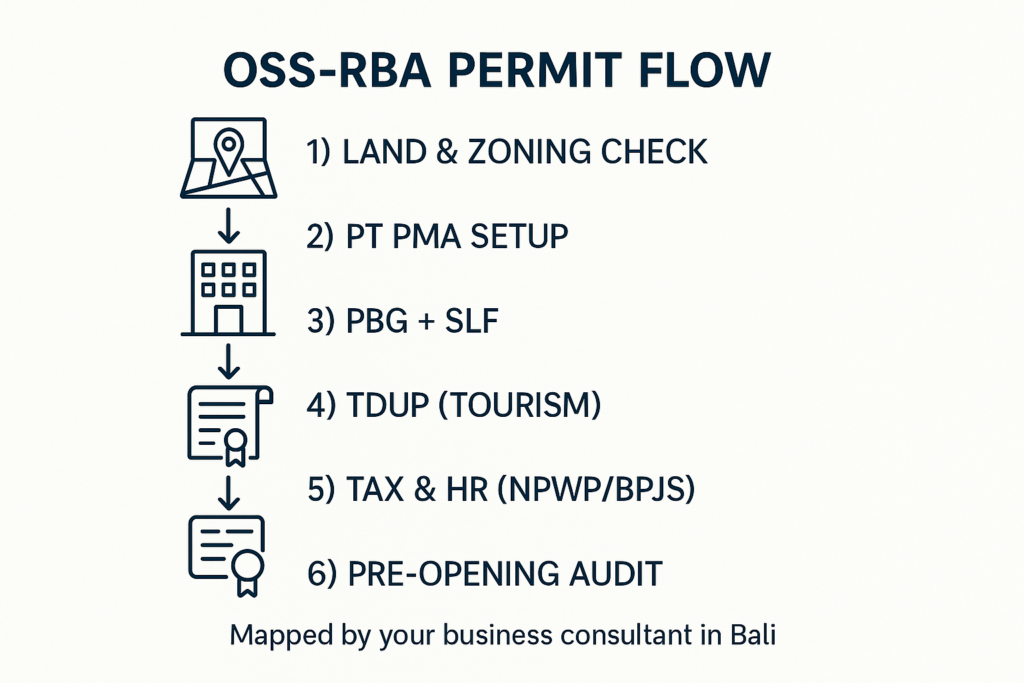
Why a Business Consultant in Bali Is Critical for Compliance
Setting up a business in Bali (and Indonesia in general) means working within a strict legal framework. The Indonesian government has modernized licensing through the Online Single Submission – Risk-Based Approach (OSS-RBA) system, which centralizes permits and classifies businesses by risk level [Bizindo]. Through OSS, entrepreneurs obtain their NIB (Business Identification Number), location permits, and sectoral licenses. Compliance is not optional – it’s the law, and enforcement is getting stricter.
Key compliance factors investors must address include:
- Proper Business Entity (PT PMA): Required for foreign investors. Using local “nominees” is illegal and highly risky [ILA Global Consulting].
- Zoning and Land Use: Build only in approved zones. Bingin demolitions in 2025 proved that ignoring zoning leads to bulldozers [ABC News].
- Licenses & OSS Reporting: Tourism, alcohol, environmental, and operating permits must be kept current. Missing updates risks frozen licenses.
- Tax Compliance: Regular reporting is mandatory. Non-compliance leads to audits, fines, and reputational damage.
- Visas & Hiring Laws: KITAS for expats and BPJS for staff are non-negotiable. Violations can mean deportations and sanctions.
Bottom line: Bali authorities have made it clear: investors are welcome only if they follow existing regulations.
Case Study: When Compliance Is Ignored – Bingin Beach Demolitions (Bali, 2025)
In July 2025, Bali’s provincial government demolished 48 villas, restaurants, and guesthouses along Bingin Beach. Governor Wayan Koster stated bluntly: “None of them have permits.” [ABC News]
The fallout was devastating: millions in investments lost, 1,000 employees suddenly jobless, and communities disrupted. Authorities had issued warnings, but many ignored them. Similar actions shut down PARQ Ubud earlier that year, a multimillion-dollar luxury complex operating without proper permits [ABC News].
💡 Lesson: Short-term profits from skirting rules can turn into total loss. Compliance isn’t optional—it’s survival.
How a Business Consultant in Bali Aligns Your Concept with the Market
Even fully compliant businesses fail if their concept is misaligned with the market. Bali is littered with shuttered hotels and restaurants that legally opened but couldn’t attract customers.
Common mistakes include:
- Building luxury resorts in backpacker zones.
- Opening overpriced restaurants where tourists want casual warungs.
- Launching wellness retreats in nightlife districts.
Feasibility studies and concept audits prevent these errors. They validate target guests, pricing, and location before money is spent. A strong business consultant in Bali provides this clarity, saving investors from costly missteps.
Pitfalls of Poor Market Alignment
- Overbuilt Boutique Hotel: Gorgeous but misplaced in a budget tourist area → closed within 2 years.
- Trendy Restaurant: Stylish menu, but mispriced for the local market → shuttered within a year.
- Wellness Retreat: Great concept, wrong location → bad reviews, no repeat guests.
These failures all trace back to skipping feasibility studies and ignoring guest alignment.
Compliance + Strategy = A One-Two Punch for Success
When compliance and concept strategy come together, investors get:
- No costly delays from permits.
- Easier financing from banks and partners.
- Operational stability through changing regulations.
- Community goodwill by respecting culture and rules.
The difference between thriving ventures and costly failures comes down to one choice: work with a business consultant in Bali or gamble on guesswork.
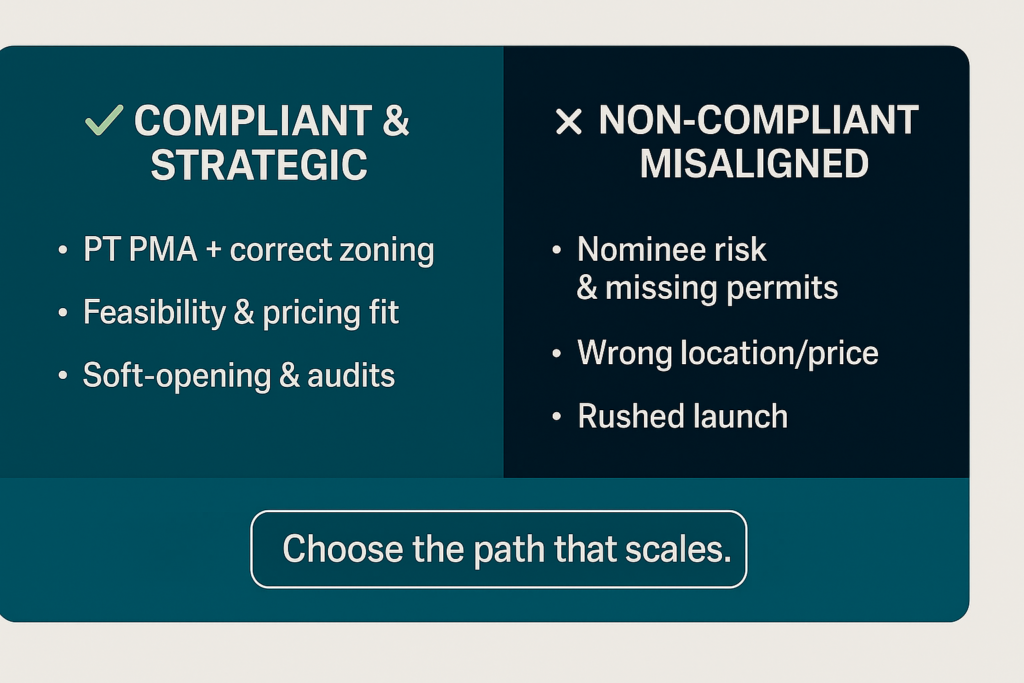
Turning Insight into Action: How Consulting Services Add Value
Examples of consulting impact:
- Resort saved pre-launch: Concept scaled correctly + permits secured → 80% occupancy in first season.
- Restaurant repositioned: Menu & pricing realigned + alcohol license fixed → traffic surged.
- Hotel pre-opening: Staff trained + all SLF permits cleared → flawless launch and strong reviews.
Consultants bridge vision with execution, ensuring projects are 100% compliant and 100% market-ready.
Conclusion: From Vision to Reality – Your Next Steps
Bali offers incredible opportunities, but success requires both compliance and strategy. Ignoring either puts your investment at risk.
At Zenith Hospitality Global, we provide end-to-end consulting:
- PT PMA & licensing setup
- Feasibility studies
- Concept audits
- Pre-opening support
- Ongoing advisory
FAQ: Business Consultant in Bali
1. Do I really need a PT PMA to start a business in Bali?
Yes. For most foreign investors, a PT PMA (foreign investment company) is the only legal way to own and operate a business. Using “nominees” is illegal and highly risky [ILA Global].
2. What happens if I don’t have the right permits?
Authorities in Bali have demolished or shut down non-compliant businesses, including 48 Bingin Beach villas in 2025 [ABC News].
3. How can feasibility studies save my investment?
They ensure your concept aligns with Bali’s market realities—target guests, pricing, and location—before you commit capital.
4. What services does a business consultant in Bali provide?
We cover PT PMA setup, OSS licensing, zoning due diligence, feasibility studies, hotel and restaurant audits, wellness planning, and pre-opening support.
5. How do I start working with you?
You can request a consultation today, and we’ll design a compliance + strategy roadmap tailored to your project.
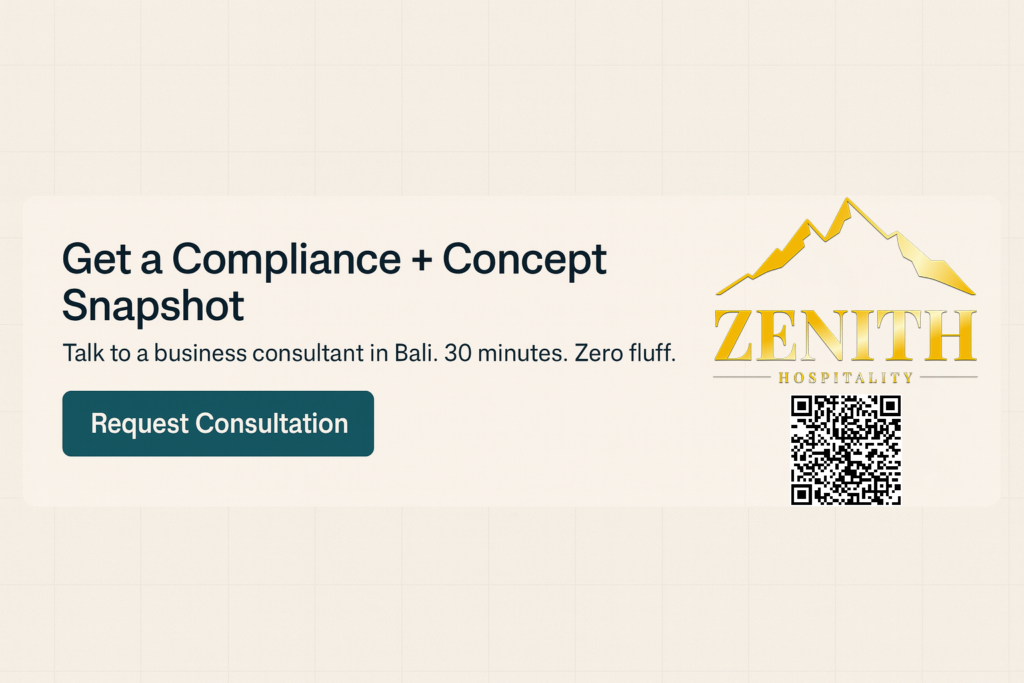
Partner With Zenith Hospitality Global
Whether you’re a foreign investor protecting millions in capex or a local owner scaling your first villa, restaurant, or wellness concept, professional consulting bridges the gap between vision and results.
✅ Request your consultation — we’ll map an ROI-driven plan for your property.
📲 Contact us directly on WhatsApp to discuss your project.
🔗 Follow us on LinkedIn for insights and case studies.
Don’t gamble with your investment. Work with a business consultant in Bali who ensures your project is 100% compliant and 100% market-ready.

